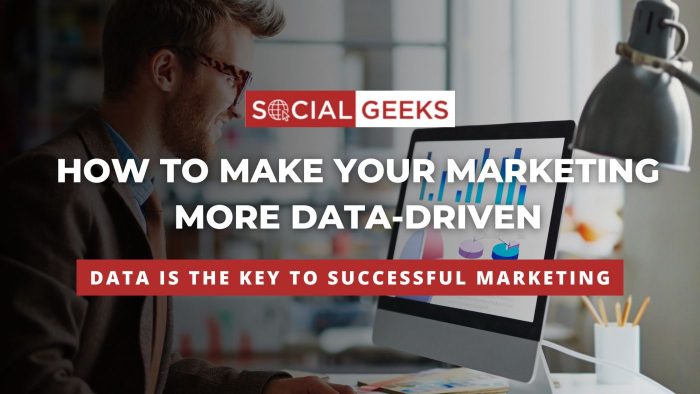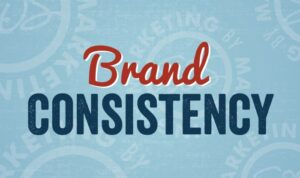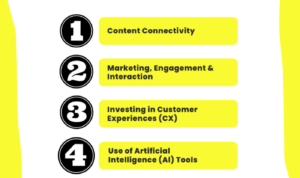Using Data to Drive Marketing sets the stage for a data-driven revolution in the world of marketing, where insights and analytics reign supreme. Dive into the realm of leveraging data to craft compelling campaigns and drive business success.
Importance of Using Data in Marketing

Data plays a crucial role in driving successful marketing strategies in today’s digital age. By leveraging data, marketers can gain valuable insights into consumer behavior, preferences, and trends, allowing them to create targeted and personalized campaigns that resonate with their target audience.
Enhancing Marketing Campaigns with Data
Utilizing data analytics tools, marketers can track and analyze customer interactions across various channels such as social media, websites, and email campaigns. This data can help marketers understand which strategies are most effective in engaging their audience and driving conversions. For example, by analyzing website traffic data, marketers can identify popular pages, click-through rates, and conversion rates to optimize their website for better user experience and lead generation.
Benefits of Using Data-Driven Approaches in Marketing
- Personalization: Data allows marketers to segment their audience based on demographics, behavior, and preferences, enabling them to deliver personalized content and offers that are more likely to resonate with individual customers.
- Improved ROI: By analyzing data on campaign performance and customer interactions, marketers can optimize their marketing spend to focus on strategies that yield the highest return on investment.
- Enhanced Targeting: Data-driven marketing enables marketers to target specific segments of their audience with relevant messaging, increasing the likelihood of conversion and customer retention.
- Real-Time Insights: With access to real-time data analytics, marketers can quickly adapt their strategies based on changing market trends and consumer behavior, ensuring that their campaigns remain agile and effective.
Types of Data Used in Marketing

Data plays a crucial role in shaping successful marketing strategies. Let’s dive into the different types of data commonly utilized in marketing and how they impact decision-making.
Customer Data
Customer data includes information such as purchase history, browsing behavior, and interactions with the brand. Leveraging customer data allows marketers to personalize campaigns, tailor messaging, and create targeted offers based on individual preferences.
Demographic Data
Demographic data provides insights into the characteristics of a target audience, such as age, gender, income, education level, and location. By analyzing demographic data, marketers can better understand their customers’ needs and preferences, leading to more effective marketing campaigns and product development.
Behavioral Data
Behavioral data tracks how customers interact with a brand across various touchpoints, such as website visits, email opens, and social media engagement. This type of data helps marketers identify patterns, predict future behavior, and optimize marketing strategies to drive engagement and conversions.
Transactional Data
Transactional data includes information on purchases, returns, and customer interactions during the buying process. Analyzing transactional data allows marketers to identify trends, measure the success of marketing campaigns, and optimize pricing strategies to maximize revenue and customer satisfaction.
Tools and Technologies for Data-Driven Marketing
In the realm of data-driven marketing, there are several tools and technologies that play a crucial role in collecting, analyzing, and utilizing data to drive marketing strategies effectively.
Popular Tools for Collecting and Analyzing Marketing Data, Using Data to Drive Marketing
- Google Analytics: A widely used tool for tracking website traffic, user behavior, and conversion metrics.
- HubSpot: Helps in managing customer data, creating targeted campaigns, and tracking marketing efforts.
- Adobe Analytics: Provides insights into customer interactions across various channels and touchpoints.
- Mailchimp: Enables email marketing campaigns with data-driven insights for improved engagement.
Different Technologies for Implementing Data-Driven Strategies
- Customer Relationship Management (CRM) Systems: Integrating CRM systems like Salesforce or Zoho CRM can help in managing customer data effectively.
- Data Visualization Tools: Tools like Tableau or Power BI help in creating visual representations of data for better understanding and decision-making.
- Marketing Automation Platforms: Platforms such as Marketo or Pardot automate marketing processes based on data insights and customer behavior.
AI and Machine Learning in Data-Driven Marketing
Artificial Intelligence (AI) and Machine Learning are revolutionizing data-driven marketing efforts by enabling businesses to analyze large datasets quickly and derive actionable insights. AI algorithms can help in predicting customer behavior, personalizing marketing campaigns, and optimizing marketing strategies for better results. Machine learning models can identify patterns in data that humans might overlook, leading to more targeted and effective marketing campaigns.
Strategies for Effective Data Utilization
In today’s digital age, leveraging data effectively is crucial for personalizing marketing campaigns and optimizing strategies. By utilizing data insights, businesses can tailor their approach to target audiences more accurately and drive better results.
Utilizing Data to Personalize Marketing Campaigns
Personalization is key in marketing to engage with customers on a deeper level. By analyzing customer data such as demographics, behavior patterns, and preferences, businesses can create targeted campaigns that resonate with their audience. This can include personalized recommendations, customized offers, and tailored messaging that speaks directly to the individual customer.
Optimizing Marketing Strategies with A/B Testing
A/B testing, also known as split testing, is a powerful tool for optimizing marketing strategies based on data insights. By testing different variations of a campaign with a control group, businesses can gather data on what resonates best with their audience. This data-driven approach allows for informed decision-making and continuous improvement of marketing tactics.
Examples of Successful Data-Driven Marketing Campaigns
Many successful marketing campaigns have been driven by data analysis, showcasing the power of leveraging data effectively. For example, Amazon’s personalized recommendation engine uses customer data to suggest products based on past purchases and browsing behavior, leading to increased sales and customer satisfaction. Similarly, Spotify uses data on listening habits to create personalized playlists for users, enhancing the user experience and driving engagement.
Challenges in Using Data for Marketing: Using Data To Drive Marketing
Implementing data-driven marketing approaches can be met with various obstacles that hinder the effectiveness of campaigns. These challenges range from technical issues to privacy concerns and require strategic solutions to overcome.
Common Obstacles Faced in Data-Driven Marketing
- Difficulty in collecting accurate and relevant data due to data fragmentation across multiple sources.
- Lack of skilled personnel who can interpret and analyze data effectively for actionable insights.
- Integration challenges when trying to combine data from different systems and platforms for a comprehensive view.
- Limitations in data quality, such as incomplete or outdated information, leading to inaccurate marketing decisions.
Privacy Concerns in Collecting and Utilizing Customer Data
- Customers are increasingly concerned about the misuse of their personal information, leading to potential backlash and loss of trust.
- Stringent data protection regulations, like GDPR, require marketers to handle customer data responsibly to avoid legal implications.
- Balancing the need for personalized marketing with respecting customer privacy preferences can be a delicate tightrope to walk.
Strategies for Overcoming Challenges in Data-Driven Marketing
- Investing in data management tools and technologies to streamline data collection, storage, and analysis processes.
- Providing continuous training and upskilling opportunities for marketing teams to enhance data literacy and analytical capabilities.
- Implementing strict data governance policies to ensure compliance with regulations and build trust with customers.
- Regularly auditing data sources and quality to maintain the accuracy and relevance of marketing data.




